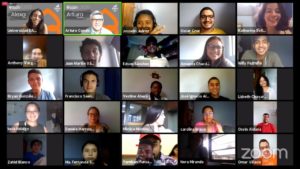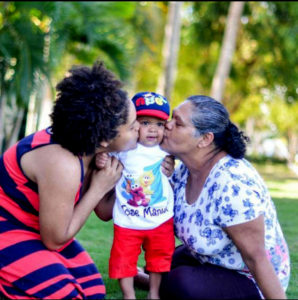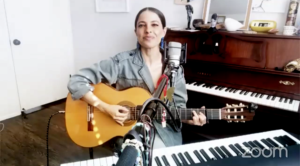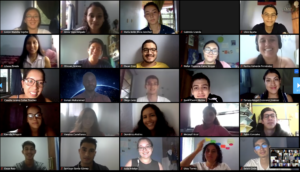‘Dignity’ means dismantling invisible borders
On October 14, the EARTH University community came together – virtually – to celebrate our fourth annual Global Dignity Day. The event provided a digital space for all to share and reflect on personal stories of struggle and triumph. It also served as a reminder that, through individual and collective actions, we can break down imaginary boundaries and dignify our own lives and the lives of others.
Borders that preserve injustice
Seated in front of their respective screens, participants are asked to visualize a cross-border community between Costa Rica and Nicaragua where, before the pandemic, there were no physical boundaries, no fence or wall, no river. There was no immigration station, no dividing road, no raised flag of one country or the other.
Between San Vicente (Costa Rica) and El Tablón (Nicaragua), the only border was a line imagined by politics – not by nature, the residents of both communities, or daily life. María Fernanda Cruz describes the heavy heat, the dense tropical foliage, and the lives of the people who inhabit that area.
Cruz is a journalist who, until recently, worked as an editor at The Voice of Guanacaste, a bilingual newspaper that investigates human rights abuses, migration issues, gender violence, corruption, and pollution in northwestern Costa Rica. Cruz traveled on assignment to San Vicente-El Tablón, where she discovered the story of Darys Mora. Upon comparing her own life to Mora’s, Cruz concluded that not all people have access to the same opportunities, enjoy the same rights and privileges, or are supported in living a dignified life.
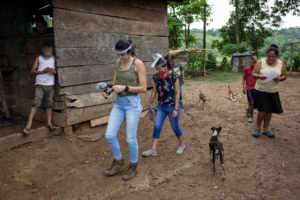
Journalists María Fernanda Cruz and Noelia Esquivel doing research in San Vicente. Photo by César Arroyo-La Voz de Guanacaste.
Cruz, our Dignity Day guest speaker, then tells the following story:
On December 19, 2018, Mora left her home in San Vicente to buy a gift in El Tablón. She walked the usual trails, reached the Nicaraguan side, and vanished.
When Mora failed to return home, her family organized an hours-long search. Unsuccessful, they reached out for help from the police in Costa Rica. The officers waved off the request, saying they could not look for Mora because she had been outside their territorial jurisdiction.
“The border had never been a concept to [the community]. They were accustomed to moving freely along the same trails. However, the police insisted they were unable to look for her because they could not go to ‘the other side’,” Cruz adds. “But what is ‘the other side’ when the border is invisible?”
Despite the inactions of the police, the community of Costa Ricans and Nicaraguans jointly searched for Mora. A few hours later, she reappeared – dead.
This femicide has not been counted in the official statistics of either nation because Mora was born and died on one side but lived on the other. The killer was declared a fugitive, the crime went unpunished, and the women of San Vicente-El Tablón live in daily fear that they too might vanish. A family was degraded by the violence of not only one murderous man but also a system based on imaginary borders. Where is the human dignity in that?
Mora’s story deserved to be told. La Frontera Dibujada (The Drawn Border) is a binational collaboration between three media outlets: The Voice of Guanacaste, Confidencial (an investigative news organization in Nicaragua), and Interferencia (a program of Universidad de Costa Rica’s radio network).
Eventually, Mora’s heartbreaking story was published. The experience of producing it drove Cruz to outline three easy tasks that would help her – or anyone else – advance the dignity of others:
- Reading. Whenever we hold a cell phone in our hands, we wield great power. Every time we click on or share a story that deserves to be told, we support hardworking independent journalists and activists, as well as families facing injustice.
- Listening. Letting people express themselves boasts a healing power. When we listen to others, we begin to understand that borders need not and do not separate us.
- Storytelling. Being vulnerable by telling our own story helps foster empathy and tolerance in people near and far.
Although Cruz says she arrived too late to help Mora, she did come in time to help Mora’s family and community tell their story, uplifting their voices and visibilizing their struggle.
Borders that impede dreams
When EARTH student Yulyana Duarte Mendoza (’21, Costa Rica) begins sharing her story, tears well in her eyes but her voice remains steady. There is strength in her vulnerability. Until recently, Yulyana had her life plans totally defined. She was studying at EARTH, pursuing her dream of becoming an agricultural engineer. Then, everything changed. She learned she was three-months pregnant.
Although the first two tests were positive, she convinced herself it was a psychological pregnancy – all in her head – because there was no room to deviate from her plans. During the ultrasound, she heard a heart beating vigorously alongside her own. The life she had planned for herself seemed to be falling apart. She felt lost.
It took her a while to understand that her dreams had, in fact, not been shattered.
“My child’s eyes told me that my life was not over, that his arrival marked only a new beginning for me, and that this mutation I was going through – these drastic changes – were necessary,” Yulyana says. “The world traps us in ideals about perfection, but no one is perfect. I realized that looking, with love, at myself in the mirror was synonymous with revolution, an act of rebellion. Now I feel free, empowered by my body, my sexuality, and my life.”
Throughout the experience, Yulyana realized that asking for help is not a sign of innate weakness, that there are always hands reaching out to nudge us forward, and that, even if plans change, nothing should stop us from pursuing our dreams.
Borders that deny self-love
Costa Rican singer-songwriter Debi Nova is known for her talent and bravery. Still, she has had to work hard to earn the global recognition she enjoys today. Every time one of her projects fell apart along the road to stardom, she had to look inward and be kind to herself.
“When the inevitable happens, when life poses obstacles and challenges and takes us through ups and downs, we must return to our own dignity, recognizing it in order to honor others,” Nova says, before singing about self-love and living valiantly with conviction.
Francely Flores (’20, Guatemala) reveals that part of her own dignity stems from having the freedom to reinforce the choices she has made in her life, such as chastity until marriage. Despite the prejudices that surround the issue, Francely defends the right of every person to live the way that suits them, as long as it is done responsibly and respectfully.
As a child, Jhohan Piero Elguer (’23, Peru) had to migrate from his rural highland village to urban Lima. During his adaptation process in the big city, he began realizing that others were mistreating him because he came from a different context, one with unfamiliar customs and a distinct cosmovision. Arriving at EARTH, he worried that painful situation might repeat itself – that is, until he was embraced by a rich multiculturalism on campus. The combination of our idiosyncrasies and cultures is what renders society beautiful. Therefore, we must honor what makes each of us unique.
In closing, Cruz repeats Yulyana’s words: Seeing ourselves with loving eyes is an act of rebellion. Defending the inherent value of others is an act of rebellion. Breaking down invisible boundaries that prevent anyone from dreaming, growing, or living is an act of rebellion.
For dignity, we are all rebels.

